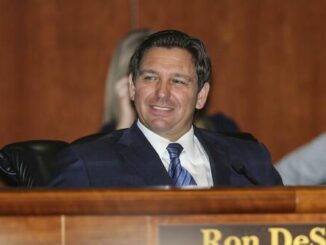
ENB Pub Note: Interesting Points on the political situation in the U.S., and some of the ideas sound very good. This may be the only way back to energy independence, through the use of all forms of energy by getting rid of “Legislation by Regulation.” Only if the U.S. is energy independent, fixes the border, brings independence to the media, cut government spending, solid elections, and improves foreign relations, can the U.S. really hope to survive.
Authored by Roger Kimball via American Greatness,
Suppose a document drops in the wilderness and no one is around to hear it. Does it make a sound?
I submit that John Durham just tested this Bishop Berkeleyesque query. The special counsel spent four years beavering away in the forests of the deep state and what did he produce?
Three hundred pages telling us what, for the most part, we already knew and with the result that exactly nothing, apart from a little hand wringing, will happen.
We already knew that James Comey, Robert Mueller, Andrew McCabe, Peter Strzok, Lisa Page, Bruce Ohr, Nellie Ohr, John Brennan, Susan Rice, Michael Sussmann, Kevin Clinesmith, and all the other characters in and around the Russia Collusion Delusion had fabricated the story of Trump’s supposed connection with Russia out of whole cloth.
We already knew that they had gone out of their way to protect Hillary Clinton.
We knew that there was no predicate for obtaining a FISA warrant against Carter Page (one of many thousands of such warrants), thus opening a back door into the Trump campaign.
We knew that the surveillance apparatus of the regime had been weaponized to prevent Donald Trump from being elected and then, when he surprised everyone by winning anyway, to taint his administration and render him radioactive.
What should we make of Durham’s non-revelatory revelations? I think that, wittingly or not, they were just a big exercise in track-covering, full of sound and fury, signifying nothing. Well, nothing beyond the sound and fury, anyway.
Still, Durham’s bulletin is useful as a marker of the futility in which we labor. Andr? Gide touched on this point when he reminded us that “Toutes choses sont dites d?j?, mais comme personne n’?coute, il faut toujours recommencer.” Over the past five or six years, virtually everything that Durham said in his report had already been said. But because no one was listening, it is necessary to start again and say it once more.
In this spirit, I am going to say again some things I have said elsewhere, beginning with what has become my ritual invocation of British Prime Minister Harold Wilson’s observation that a week is a long time in politics. That’s time enough, as T. S. Eliot said in another context, “for a hundred indecisions, And for a hundred visions and revisions, Before the taking of a toast and tea.”
Until the night of March 5, 2023, I suspected that “The Donald Trump Show,” which has been such blockbuster entertainment, might have entered its final season. That’s still possible, of course. The people clamoring for its cancellation are many and vociferous. Moreover, they have another concession with which they propose to entertain us: “The Ron DeSantis Deliverance.” Someday, I’d like to see that show myself.
I wonder, though, about the most profitable time to air it. 2024? Perhaps. But I think the jury is still out on that. We’ll know more after DeSantis finally announces what he has already made clear, namely that he, too, is running for the presidency in 2024. He will, if the past is any guide, get a bump in the polls. But at the moment, anyway, I am inclined to think that 2024 belongs to the Donald. Why? There are many reasons.
One vivid reason was vouchsafed us during the final hours of the 2023 Conservative Political Action Conference (CPAC) program in National Harbor, Maryland, in March. It was then that Trump addressed the crowd. C-SPAN described the speech as “remarks.” To me, the word “remarks” suggests something brief and casual. Trump’s performance was long and, for Trump, well-prepared.
As usual with the former president, the talk was peppered with digressions and offhand observations. But he was clearly following a script. Chris Christie, formerly an ally, sighed that the room was only half full (was it?) and that Trump was “not what he used to be.” Opinions about that vary. I thought the talk bristled with rhetorical electricity. And in terms of substance, it was one of the most forthright and powerful political speeches I’ve heard.
Earlier that day, Trump had won the CPAC straw poll with 62 percent of the vote. DeSantis was the runner-up with 20 percent. As of May 19, with a half a dozen Republican candidates in the field, Trump leads by 42 points. Is that significant? I don’t know. It’s early days. DeSantis hasn’t even officially declared yet, A week is a long time, etc., etc.
But right now, as of May 20, I would say this about the 2024 race on the Republican side: There are two plausible candidates: Trump and DeSantis.
DeSantis has the blessing of the donor class and Conservatism, Inc. He’s a great governor and would probably make an effective president.
Trump has the unwavering support of the MAGA millions and most allotropes of the dissident Right. There’s plenty of exasperation about Trump, not least among those who worked with him in his first term. He’s a difficult, demanding, and mercurial person. But his CPAC speech (and, more recently, his performance at a CNN “townhall” with Kaitlan Collins) demonstrated why he’s beloved by his supporters and feared and hated by his opponents.
Trump said many bold and controversial things in the course of his speech.
I’ll concentrate on two themes.
The first–it was the thing that really set heads spinning–revolved around the word “retribution.”
“In 2016,” he said, “I declared, I am your voice. Today, I add, I am your warrior, I am your justice, and for those who have been wronged and betrayed, I am your retribution.”
And just in case you missed that last bit, he repeated it. “I am your retribution.”
The pundits love-hated that, just as they were appalled by this promise: “I will totally obliterate the deep state.” I think he meant it, too. “I will fire the unelected bureaucrats and shadow forces who have weaponized our justice system. . . . I will put the people back in charge of this country again.”
‘Tis a consummation devoutly to be wished.
Could he actually do it? That’s a very good question. His track record during his first term was impressive but not dispositive, partly because he was surrounded by the swamp and its denizens. Really, he didn’t know any better. He came to office as an outsider, a na?f. He actually thought that Jim Mattis and Rex Tillerson were on his side. Imagine that.
He has been disabused of those sentiments, though who exactly he can rely on as allies remains an open question. Personnel will once again be a critical problem for Trump were he to reoccupy 1600 Pennsylvania Avenue.
Here’s a bit of unsolicited advice that I have for the former president should he be elected again: Stay out of Washington as much as you can. Stop the newspapers. Have your mail forwarded.
Washington really is a swamp and it will consume you. And here are a few particular bits of advice:
1) Have the inauguration in Mar-a-Lago.
2) Govern from Florida as much as you can.
3) If you decide to indulge in the theater of the State of the Union Address as it has evolved, deliver it from, say, Kansas.
4) Disband the FBI. We should never have allowed a national police force to come into being.
Move the bits of the government you can’t actually destroy to other parts of the country.
Do these things instantly–the day you take office. The deep state will howl. The bureaucrats will oppose you. The lawyers will sue you. Do it anyway. Act first, deal with the consequences later.
Conduct metaphorical dawn-raids on their people and institutions just as they weaponized the Justice Department against you and your supporters. That would not only be the retribution you seek, it would also be reciprocity. Speed and thoroughness will be of the essence. If you hesitate, if you are half-hearted, you will be lost.
These are points I have made before. The focus should be on eclipsing Washington, D.C. as the seat of government. It has long been obvious to candid observers that there is something deeply dysfunctional about that overwhelmingly Democratic, welfare-addicted city. It is a partisan sinkhole. Jefferson wanted the capital moved from New York to Washington in part to bring it closer to the South, but also to place it somewhere that was officially neutral. There is nothing neutral about Washington today. The city has some impressive architecture and urban vistas. They should be preserved and staffed as tourist attractions. But the reins of power should be relocated.
The more I think about our situation, the more I believe the only hope for the republic is to downgrade the place of Washington in our public life. The business of Washington is to make government bigger–forever. That is not what the people, who pay for it, want. Legitimacy is draining out of our governing institutions at an alarming rate. Stanching that debilitating flow requires that we redirect our attention away from the greedy puppet show in Washington to the true source of legitimacy, which is with the people.
Trump is one of the few people with the temerity to attempt such a thing. Perhaps he can appease some of his critics by proposing we rename Washington to George Floyd City. I would be OK with that. In any event, the actual government of the country should be moved to some neutral ground, out of the overwhelmingly corrupt cesspool that is Washington.
The other bit of Trump’s CPAC speech that I want to mention concerns NATO. Trump did not, as some commenters asserted, “muse about Russia blowing up the NATO headquarters.” Rather, he talked about the folly of NATO spending billions to construct a huge headquarters for itself. Would they not have been better advised to construct a hardened bunker? After all, Trump pointed out, Russia could destroy the shiny new headquarters with a single missile.
Bill Kristol, seizing on the idea that Trump was musing about blowing up NATO headquarters, took to Twitter to make “the most obvious point: This man cannot be our next president.” Kristol was also aghast at Trump’s call for an “all-European NATO, with the United States as an ally but not a member.” “One of the problems with the involvement of the United States in NATO,” he said, “is that it dilutes the nationalist impulse.” Can you believe that? He actually praised “the nationalist impulse.” How Hitlerian can you get?
Unfortunately for Bill Kristol, though, those last observations come not from Trump (though he would probably agree with them) but from someone else named Kristol: Irving Kristol, Bill’s father, who in 1983 wrote an essay called “What’s Wrong With NATO?” After the Soviet Union fell, Irving Kristol went on to express doubts about the future role for NATO in European politics altogether.
If that seems surprising, it’s only because you have failed to appreciate just how long a week in politics can be.
Loading…



